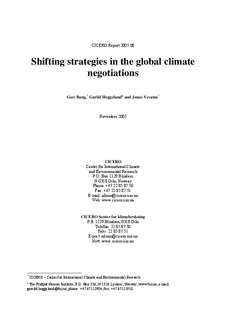Shifting strategies in the global climate negotiations
Research report
Permanent lenke
http://hdl.handle.net/11250/192016Utgivelsesdato
2005Metadata
Vis full innførselSamlinger
- CICERO Reports [210]
Sammendrag
Although the international climate change regime represents a genuinely global policy process, some actors have a more pivotal role than others – either as dynamos that drive the process, or as barriers to further development. We focus on four pivotal actors, which also are the four largest emitters of greenhouse gases in the world: the United States, China, the European Union, and Russia. We argue that the withdrawal of the United States from the Kyoto process has led to a shift of strategies in the climate regime, with a more pronounced split between the EU and like-minded countries on the one side and G77/China and the USA on the other, and Russia playing an even more pivotal role than it did earlier. We point out how understanding the role of domestic policies and pressure groups is vital for understanding the positions and strategies taken by countries examined here. We discuss how the current developments in their policy-making can explain the shift of alliances in the climate regime, and what it might mean for the future of international climate collaboration, and conclude on whether or not interests are becoming more polarized.
